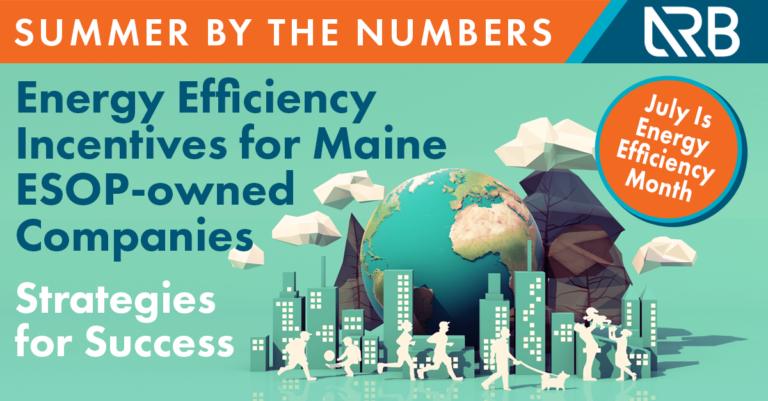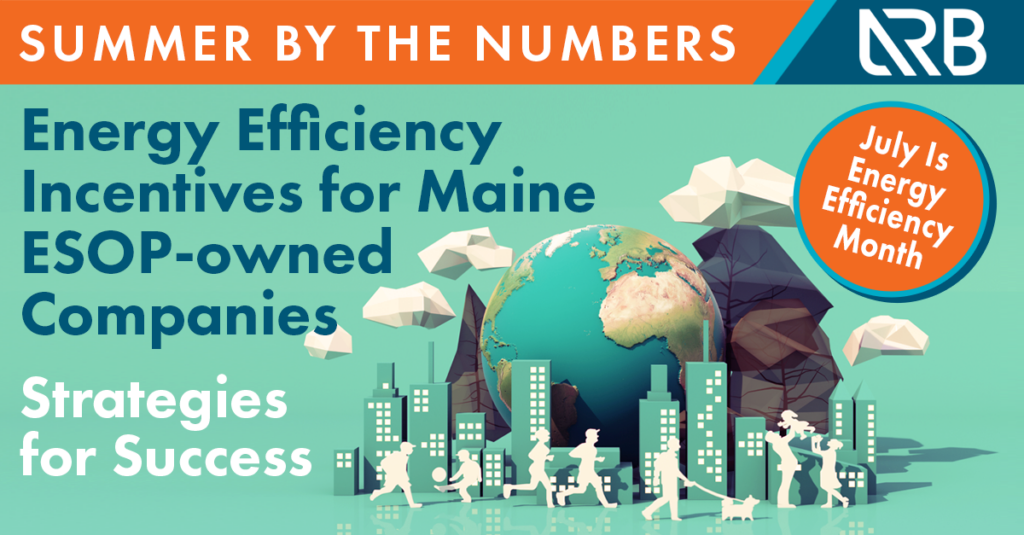Energy efficiency is an important consideration for any business, including those owned by Employee Stock Ownership Plans (ESOPs). Embracing energy efficiency reduces operational costs and environmental impact, benefiting all employee-owners. Maine offers a variety of energy efficiency incentives regardless of a business’s income tax situation that can help ESOP-owned companies achieve these goals. Here we explore the value of these incentives and outline strategies for successful implementation.
Understanding the Value of Energy Efficiency Incentives
Energy efficiency incentives are designed to encourage businesses to adopt practices and technologies that reduce energy consumption. These incentives provide financial assistance to offset the initial costs of energy-efficient upgrades, making it easier for companies to invest in long-term savings. For ESOP-owned companies, leveraging these incentives can lead to significant benefits:
- Cost Savings: Reducing energy consumption lowers utility bills, freeing up capital that can be reinvested in the company or distributed among employee-owners.
- Enhanced Sustainability: Energy efficiency measures reduce the environmental impact of business operations, contributing to broader sustainability goals.
- Improved Employee Morale: Participating in sustainability initiatives can boost employee pride and engagement, as they see their efforts contributing to a greater good.
- Increased Company Value: Energy efficiency can enhance the overall value of the company by reducing operational costs and increasing profitability, directly benefiting ESOP participants.
Key Incentives Available in Maine
Maine offers a comprehensive suite of energy efficiency incentives through Efficiency Maine, designed to support a wide range of energy-saving projects. Here’s a look at some of the available incentives, and why ESOPs may want to consider these opportunities:
- Lighting Incentives: Upgrading to LED lighting can significantly reduce energy consumption and maintenance costs. For ESOP-owned businesses, the initial investment is made more manageable with Efficiency Maine incentives, leading to long-term savings that can enhance the company’s profitability and, consequently, the value of employee shares.
- HVAC Upgrades: High-efficiency heating, ventilation, and air conditioning (HVAC) systems can improve comfort and reduce energy use. ESOP-owned businesses benefit by creating a more comfortable and productive work environment for employee-owners while simultaneously lowering operational costs. Efficiency Maine offers substantial incentives for such upgrades.
- Electric Vehicles (EVs): Incentives for fleet vehicles and commercial vans encourage the adoption of electric vehicles, reducing fuel costs and emissions. For ESOP-owned businesses, this transition not only demonstrates a commitment to sustainability but also decreases transportation costs, leading to higher overall savings that benefit all participants.
- Refrigeration and Water Heating: Incentives are available for energy-efficient refrigeration units and water heating systems, which can lower energy costs in food service and other industries.
- Weatherization: Multifamily weatherization incentives support insulation and air sealing projects that reduce heating and cooling costs. ESOP-owned businesses can use these incentives to improve building performance, leading to lower energy bills and higher comfort levels, which positively impacts employee morale and productivity.
- Energy Storage and Demand Management: Incentives for energy storage systems help businesses manage demand changes and improve resilience. For ESOP-owned businesses, this means greater energy independence and stability, reducing costs associated with peak energy demand and enhancing the company’s financial health.
Strategies for Successful Implementation
To successfully implement energy efficiency measures and take full advantage of available incentives, ESOP-owned companies should consider the following strategies:
- Conduct Energy Audits: Start with a comprehensive energy audit to identify areas where energy is being wasted and opportunities for improvement. An audit provides a clear roadmap for implementing energy-saving measures.
- Prioritize Projects: Based on the audit results, prioritize projects that offer the greatest potential for energy savings and return on investment. Consider both short-term and long-term benefits.
- Engage Employee-Owners: Foster a culture of energy efficiency by engaging employee-owners in the process. Educate them about the benefits and encourage participation in identifying and implementing energy-saving measures.
- Utilize Incentives: Leverage the available incentives discussed to reduce the upfront costs of energy efficiency projects.
- Monitor and Report Progress: Implement systems to monitor energy use and track the impact of energy efficiency measures. Regular reporting keeps everyone informed and engaged, highlighting the tangible benefits of their efforts and revealing additional opportunities.
- Continuous Improvement: Energy efficiency is an ongoing process. Continuously seek out new technologies and practices that can further reduce energy use and costs. Encourage innovation and continuous improvement among employee-owners.
Looking Ahead Energy efficiency presents a valuable opportunity for ESOP-owned companies to enhance sustainability, reduce costs, and increase the value of the company. By understanding and utilizing the range of incentives available, and implementing strategic energy-saving measures, ESOP-owned companies can achieve significant benefits. Engaging employee-owners in the process ensures that everyone contributes to and benefits from the company’s success, reinforcing the principles of shared ownership and long-term thinking that define ESOP-owned companies. Your financial advisor can help you navigate these opportunities, optimize your energy efficiency strategy, and ensure that your investments yield the greatest returns for all your employee-owners.

Ben Lord is a Principal at ARB specializing in audit and consulting services for employee benefit plans. Ben manages employee benefit plan audits in an efficient, cost-effective way by customizing services to meet a plan’s specific needs. He also specializes in consulting and financial accounting services for construction, real estate development, manufacturing, and professional services firms.






